- Expand Driving Safely
- Impaired Driving
- Child Passenger Safety
- Distracted Driving
- Drowsy Driving
- Expand Motorcycle/Moped Driving Safety
- Non-Motor Vehicle Safety: ATV, Bike, Pedestrian, & Train
- Seat Belt/Occupant Protection Safety
- Older Drivers
- Roundabouts
- Speed-Related Information
- Teen Drivers
- Work Zone Safety
- Winter Driving Safety

Motorcycle Safety Education | Registration Contacts
The Nebraska Department of Motor Vehicles (DMV) has adopted as its basic motorcycle education course, the Motorcycle Safety Foundation beginning rider course entitled “MSF: Basic RiderCourse (BRC)”. This course provides for a minimum of 14 hours of motorcycle instruction with at least 4 hours of classroom instruction and at least 10 hours of actual range time riding motorcycles. The course integrates the classroom instruction and range driving, along with concepts which apply to and practiced on the range. The basic course includes the following topics:
- Location of the controls and pre-ride procedures.
- Balance and control of the motorcycle.
- Riding skills and evasive maneuvers.
- Safety equipment and procedures.
- Effects of alcohol and drugs while operating a motorcycle.
Successful completion of any of the courses listed on the Nebraska Motorcycle Safety Education Sponsor list will allow the graduate to have the DMV examiner waive both the written and drive tests when application is made to obtain a license to operate a motorcycle. Course graduates may also be eligible for lower insurance rates. Enrollment is limited and courses often fill quickly so register early. To obtain more information or to register, contact one of the state approved beginning rider course providers from the Nebraska Motorcycle Safety Education Sponsor list.

Motorcycle Facts
The number of motorcyclists killed in crashes in 2020 was 5,579. This is the highest number of motorcyclists killed since FARS started in 1975 and a 11% increase from 2019. Per vehicle miles traveled in 2020, motorcyclist fatalities occurred nearly 28 times more frequently than passenger car occupant fatalities in traffic crashes.
To keep everyone safe, we urge drivers and motorcyclists to share the road and be alert, and we're reminding motorcyclists to make themselves visible, to use DOT-compliant motorcycle helmets, and to always ride sober.
Motorcycle deaths make up about 15 percent of all highway deaths each year in the United States. However, motorcycles only make up about 3 percent of all registered vehicles. We can link motorcycle crashes to several causes:
-
-
- Lack of basic riding skills
- Not using special precautions
- Not following speed limits
- Not wearing a helmet. Helmets reduce deaths in crashes by about 37 percent.
-
- National Highway Traffic Safety Administration (NHTSA) has estimates that the effectiveness of helmets in preventing fatalities is 37 percent for rider and 41 percent for passengers.
- Unhelmeted motorcyclists are three times more likely to suffer traumatic brain injuries than helmeted riders in a crash.
- In Nebraska, a study on hospital costs for injured motorcyclists showed a decline in total acute medical charges of 38% after the helmet law was implemented.
- Studies show unhelmeted riders involved in crashes are less likely to have insurance and more likely to have higher hospital costs than helmeted riders in similar crashes (NHTSA).
- All states who have weakened or repealed helmet laws have experienced an increase in fatality rates.
- According to the October 2022 NASIS survey of 8,000 Nebraskans conducted by UNL BOSR: “81% indicated the Nebraska law requiring motorcycle helmets should be continued; 11.7% indicated it should be repealed; 7% had no opinion.”
- Less than 1% of licensed Nebraska motorcyclists are under the age of 21 (2021 State Data).
- Motorcycle Helmets Associated with Lower Risk of Cervical Spine Injury: Debunking the Myth - 2010 by the American College of Surgeons
- Of the motorcycle riders involved in fatal crashes in 2020, 36% were riding without valid motorcycle licenses. (NHTSA)
Motorist Awareness
Safe riding practices and cooperation from all road users will help reduce the number of fatalities and injuries on our nation’s highways. But it’s especially important for drivers to understand the safety challenges faced by motorcyclists such as size and visibility, and motorcycle riding practices like downshifting and weaving to know how to anticipate and respond to them. By raising motorists’ awareness, both drivers and riders will be safer sharing the road.
Motorcycle License and Law Information
In order to operate a motorcycle on the highways in Nebraska, all operators must have a Class M (motorcycle) license or Class M endorsement on a regular operator’s license. Just having a regular Class O (operators) license does not allow an individual to operate a motorcycle; Nebraska state law requires a Class M license or Class M endorsement. Click here to view the Nebraska Motorcycle Operator Manual.
No person shall operate a moped unless the person has a valid Class O operator’s license or a valid school/learner’s permit.
Protective helmets that meet the United States Department of Transportation’s (D.O.T) Federal Motor Vehicle Safety Standard #218 are required for all operators and passengers of a motorcycle or moped. The protective helmet must be secured properly with a chinstrap on the head of the operator or passenger while the motorcycle or moped is in motion. The helmet shall consist of lining, padding, and chinstrap and shall meet or exceed the U.S. D.O.T. 218 Standard.
Special Rules for Motorcycles
- 60-6,306 Nebraska Rules of the Road; applicability to person operating a motorcycle.
- 60-6,307 Restrictions on operating a motorcycle.
- 60-6,308 Operating a motorcycle on roadways laned for traffic; prohibited acts.
Special Rules for Mopeds
- 60-6,309 Moped applicable statutes.
- 60-6,311 Moped operator; Nebraska Rules of the Road; applicable.
- 60-6,312 Moped; restrictions on operation.
- 60-6,313 Operating mopeds on roadways laned for traffic; prohibited acts.
Motorcycle Safety Education
The Nebraska Department of Motor Vehicles (DMV) has adopted as its basic motorcycle education course the Motorcycle Safety Foundation beginning rider course entitled “MSF: Basic Rider Course” (BRC). This course provides a minimum of 14 hours of motorcycle instruction with at least four (4) hours of classroom instruction and at least 10 hours of actual range time riding motorcycles. The course integrates the classroom instruction and the range driving such that following classroom instruction, the concepts are applied to and practiced on the range. The basic course includes the following topics:
- Location of the controls and pre-ride procedures.
- Balance and control of the motorcycle.
- Riding skills and evasive maneuvers.
- Safety equipment and procedures.
- Effects of alcohol and drugs while operating a motorcycle.
Successful completion of any of the courses listed below will allow the graduate to have the DMV examiner waive both the written and drive test when application is made to obtain a license to operate a motorcycle. Course graduates may also be eligible for lower insurance rates. Enrollment is limited and courses often fill quickly, so register early. To obtain more information or to register, contact one of the state approved beginning rider course providers from the Nebraska Motorcycle Safety Education Sponsor (motorcycle rider training course) list.
Motorcycle Safety Resources
- Motorcycle Safety Foundation
- Governors Highway Safety Association - Motorcycle Safety
- Motorcycle helmet effectiveness in reducing head, face and brain injuries by state and helmet law - Journal of Injury Epidemiology
- Motorcycle Helmet List
